Why FG Reopened Land Borders – Investigations

*Border closure was a failed venture -Experts
*Customs, Immigration personnel don’t deserve Taxpayers money
Almost three years after the federal government closed the nation’s land borders to trade, in what was described as a savvy move to prioritize the nation’s economy, prevent smuggling and boost indigenous production, experts have described the exercise as a failed venture.
With the 2023 presidential elections only months away, there are also allegations that the covert reason for reopening the land border is to allow easy access and influx foreign nationals to vote during the much anticipated polls next year.
Scores of Nigerian traders, freight agents and truck owners have reportedly died from unbearable fiscal burdens occasioned by the prolonged closure of the nation’s land borders. Massive job losses were recorded with over 200,000 people losing their means of livelihood in Customs brokerage alone, according to the Vice President of the Association of Nigerian Licensed Custom Agents (ANLCA) Dr. Kayode Farinto.
One year into the border closure, neighbouring countries like Benin Republic introduced charges to re-import goods stranded at the border areas as Nigerian shippers explored avenues to cut their losses.
Goods which were on transshipment to Nigeria via the Seme border, but stuck following the impromptu border closure, were made to pay new charges as imported items into Benin Republic before they were exported to Nigeria via the Benin seaports.
Recall that the federal government of Nigeria closed the land borders on the 20th of August 2019 with a view to curtailing the smuggling of goods into the country from neighbouring countries as well as ensuring compliance with existing trade rules as to how trade should be conducted.
Speaking with MMS Plus on the reopening of the land borders, a Public Affairs Analyst and Chartered Accountant, Engr. Bala Zakka stated that the border closure wasn’t necessary because agencies are paid to secure the borders.
His words: “Nigerian Immigration Service (NIS) and Nigeria Customs Service (NCS) personnel were specifically recruited to take care of our borders whether land, sea or air. This means these agencies had the onus of addressing illegal goods coming into the country and preventing them from entering the nation; this is the responsibility of Customs. On the aspect of Immigration, the nation has been experiencing an increase in terrorism and banditry because a lot of non-Nigerians, who don’t understand how the diverse citizens of Nigeria have been living peacefully, have infiltrated the nation.”
“These foreigners are causing most of the calamity having entered through the Northern borders. In terms of the economy, Nigeria hasn’t gained anything because it is the same government that lamented that the nation’s petroleum products especially Premium Motor Spirit (PMS) was being stolen via the land borders. Nothing was achieved with the border closure because criminals were still coming in and the nation continued losing PMS smuggled through the borders. We had agencies responsible for border security. There was no reason to close the land borders and there was nothing achieved with that closure.”
He also noted that the emergence of the African Continental Free Trade Area (AfCFTA) also emphasizes the need for regional economic integration and the border closure was in negation of AfCFTA.
“Customs and Immigration officers have to sit up and do their jobs because there is no point paying them with taxpayers’ money and decorating their shoulders with ranks when they can’t do their jobs,” he added.
Meanwhile, a former Director General of Lagos Chamber of Commerce and Industry (LCCI), Dr.Yusuf Muda has described the reopening of the borders as a step in the right direction.
The economic expert who was speaking during an exclusive chat with our correspondent argued that the development opens new vistas of economic benefits to the country and the ripple effects will be immense.
“We will see an improvement in trade in the West African sub-region. This is because close to 90 percent of trade within sub-region is done by road, so that border closure has really affected the integration of sub-region. Trade is a very important component of Nigeria’s economy as the trade sector accounts for about 16 percent of the nation’s Gross Domestic Product (GDP). There is also a lot of employment that comes with trade, so, the reopening of the land border will improve trade and enhance employment. It will also improve revenue generation for the government because the goods that will move across the border will attract duties,” he said.
He also described the reopened borders as good for the harmony within the Economic Community of West African States (ECOWAS) because some countries in the sub- region were not happy with Nigeria over the border closure and indulged in retaliatory measures which affected Nigerian exports.
Muda, however, agreed with Zakka that there is a dire need to strengthen the nation’s border policing and ensure that the problems that led to the closure in the first place do not reoccur.
Reacting to the border reopening, a former president of National Association of Government Approved Freight Forwarders (NAGAFF), Chief Eugene Nweke lamented that the economic and social impact of the border reopening cannot be quantified with the huge losses traders, importers and Nigerians lost to border closure.
“Do you know the amount the nation’s legitimate trading public lost to uncleared and later abandoned goods at the borders,” Nweke asked.
Noting that one of the reasons advanced by the government for the closure of the borders was to allow local production to thrive, he therefore asked the extent to which Nigerian farmers succeeded in feeding the teeming populace as envisioned by the government.
Also speaking, the Customs Area Controller, Ogun 1 Command, Comptroller Bamidele Makinde told MMS Plus that the border environs will witness socio-economic growth with more legitimate trade and employment for residents whose businesses had been abandoned since the border closure years ago.
His words: “The land borders have been reopened and we have had series of meetings with stakeholders in a bid to ensure ease of doing business for the trading community. We have engaged traditional rulers, youths, security agencies as well as crucial trading partners like freight forwarding practitioners.”
“Most business persons in the border communities are delighted at the reopening of the border because they understand that this will have significant effects on their businesses. We are all excited about this development, however, Customs will continue to ensure traders and border community residents don’t condone snuggling”
He, however, stressed that Customs understood the roles of the traditional rulers as a grassroot institution highly necessary in the crusade against smuggling, particularly when citizenry enlightenment is needed.
While there have been more investments in rice millers since the border closure, the federal government hasn’t been able to measure the progress made in this regard or other local production enhanced since the border closure.
On his part, the Chairman of National Association of Government Approved Freight Forwarders (NAGAFF), Idiroko Chapter, Hon. Uche Nwabude commended President Buhari for the development.
“The reopening of the land borders is the best thing that can happen to the country. The reopening of the border would impact everybody positively, especially people that live around the border areas. There are several small and medium-sized entrepreneurs and traders that make their living from selling commodities across the border daily.”
“Most of these affected traders had to go back to inner villages after the border closure because they didn’t want to steal. Right now, they have come out to start doing small cross-border trade that can take care of themselves and their households. So, the reopening of the border is a good one. The economic impact will be enormous,” he posited.
According to the Economic Development in Africa Report 2019 publication by the United Nations Conference on Trade and Development (UNCTAD), Intra-Africa trade was about 16.6 percent of total Africa Exports in 2017 which is low compared to 68.1 percent in Europe and 59.4 percent in Asia.
With AfCFTA, Nigeria’s reopened borders and emphasis on local production, there are wide expectations that intra-African trade would increase and consequently spark growth in economies of African nations.





